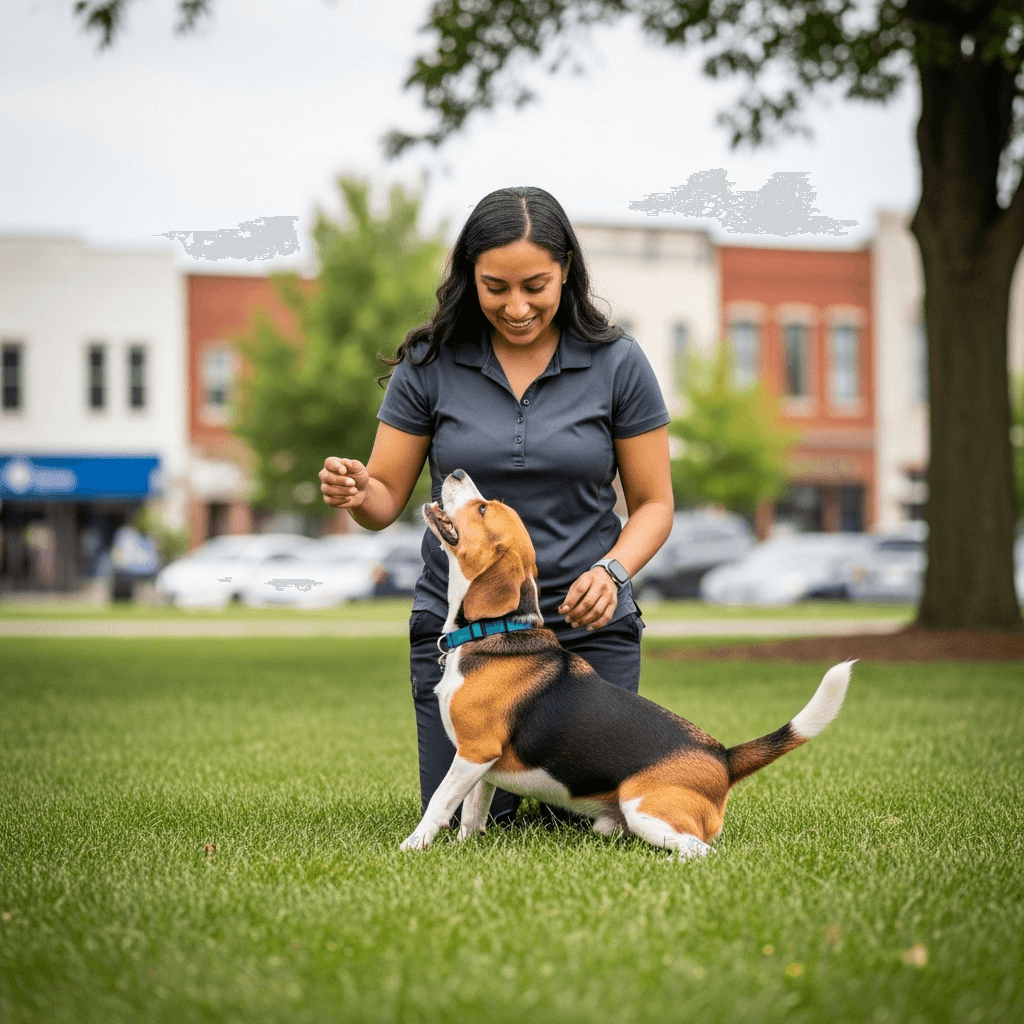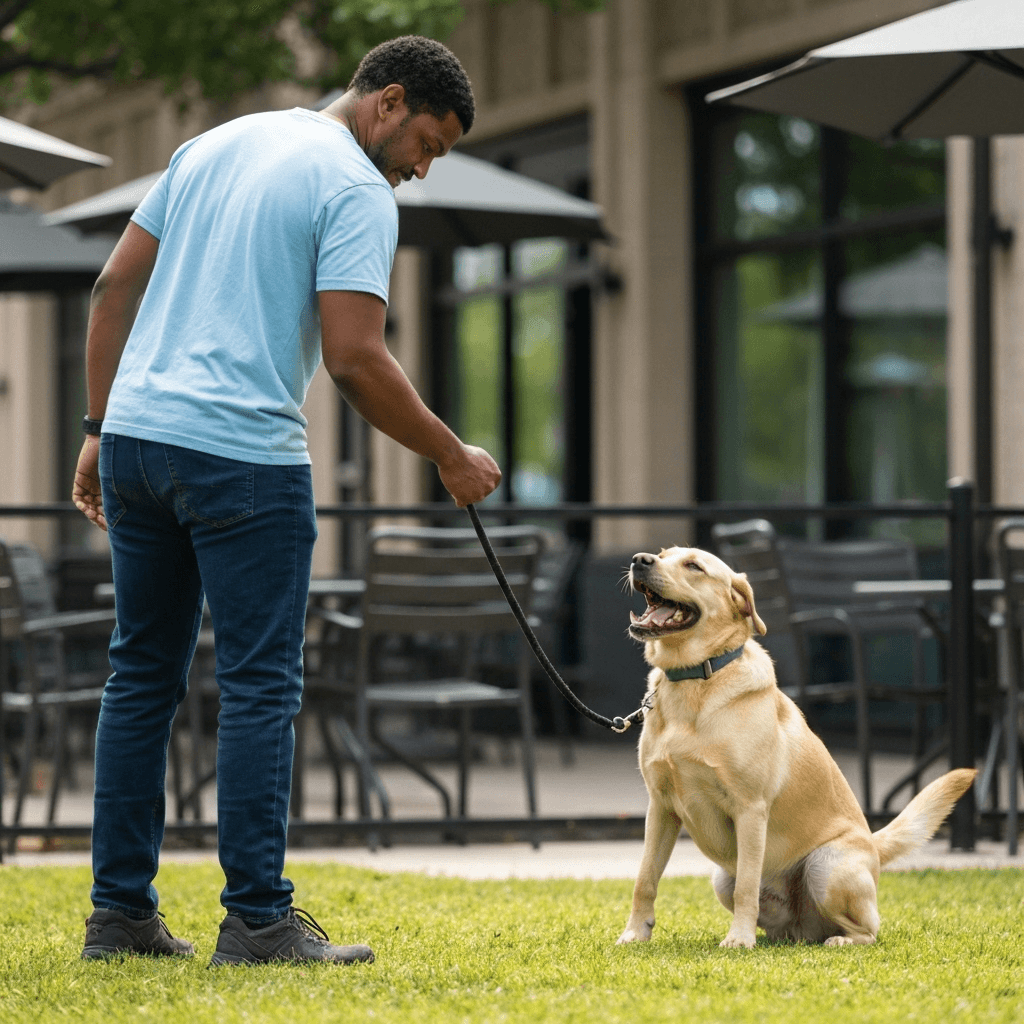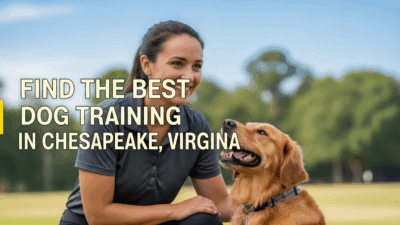Your Complete Guide to Choosing a Dog Trainer in Chesapeake VA and Surrounding Areas
Living with a dog in Chesapeake means navigating suburban neighborhoods, waterfront parks, and busy shopping areas. Your dog needs to handle all of this calmly, from loose-leash walks around the Great Dismal Swamp to staying polite during summer festivals at Chesapeake City Park.
Since Chesapeake is an independent city in Virginia, local rules follow city ordinances rather than traditional county guidelines. When you find a trainer who understands these local details, you’ll get better results both at home and out in your community. Neighborhoods like Greenbrier, Deep Creek, Western Branch, and Grassfield each have their own character, and your dog should feel confident wherever you take them.
How to Choose the Right Trainer
Start by looking for someone who uses positive reinforcement training and can set realistic goals for your Chesapeake lifestyle. This means your dog should learn to walk calmly through Chesapeake Square Mall’s outdoor areas, stay focused near busy athletic fields, and handle vet visits without drama.
Credentials give you a quick way to compare trainers’ experience levels. Common dog trainer certifications include KPA-CTP, CPDT-KA, or IAABC-CDBC for behavior problems. If your dog has serious aggression issues, look for someone with CBCC-KA or a science-based program like CTC.
In-home dog training works great for puppy manners, door greetings, and neighborhood leash skills. Group classes make sense once your dog can focus around other dogs, especially before you try busy spots like Northwest River Park.
Common Dog Training Methods Explained

Reward-based methods build the trust you want while creating lasting behavior changes. They also help you follow Chesapeake’s rules about keeping dogs under control in public.
Basic obedience covers sit, down, stay, place, recall, and leash skills so your dog can handle walks, restaurant patios, and park visits without pulling or jumping on people. These are the foundation skills that every well-behaved dog needs.
Puppy training focuses on socialization, potty training, bite control, crate comfort, and early leash training. Starting with short, positive sessions prevents bad habits from forming in the first place. Chesapeake has plenty of pet-friendly businesses where you can practice these skills once your puppy is fully vaccinated.
Behavior modification addresses fear, reactivity, resource guarding, or separation anxiety through careful desensitization and counterconditioning. For serious cases, ask if your trainer works with local veterinarians who understand behavior medications.
Private lessons and in-home sessions let you customize everything around your daily routines, while day training can speed up results when you’re short on time. Many Chesapeake families juggle work and military schedules, making flexible training options valuable.
Group classes help your dog practice good manners around other dogs and people. The best classes give dogs plenty of space, screen participants carefully, and teach calm behavior rather than just excitement. Look for small class sizes with no more than six to eight dogs.
Specialized options like therapy dog training or service dog training require extra structure, public-access skills, and a very clear step-by-step program. These programs often take several months to complete properly.
Stay away from trainers who use fear, intimidation, or pain to get results. Humane methods are safer for everyone, easier to maintain long-term, and much better for keeping peace with your neighbors in close-knit Chesapeake communities.
Average Cost of Dog Training in Chesapeake VA (Updated for 2025)
Prices around Chesapeake depend on the trainer’s experience, how long training sessions last, and where the training happens. Here’s what most local pet owners are paying in 2025.
| Service Type | Average Cost (Chesapeake Area) |
|---|---|
| Puppy classes (4-6 weeks) | $140-$260 total |
| Group obedience classes (4-6 weeks) | $150-$280 total |
| Private lessons (60-90 min) | $100-$180 per session |
| In-home coaching packages (4-6 visits) | $400-$850 total |
| Day training (trainer works your dog + handoff) | $425-$900 per week |
| Behavior consult for reactivity/anxiety (initial) | $140-$240 |
| Board and train (2-4 weeks) | $1,900-$4,200 total |
You’ll probably pay extra travel fees for longer distances within Chesapeake, and expect higher rates for complex behavior work or aggressive dog training. Military families stationed at nearby bases may find trainers who understand frequent relocations and special circumstances.
Make sure you understand what’s included, how the trainer tracks progress, and whether they offer a free consultation before you sign up. Many professional dog trainers in the area provide a free evaluation to discuss your goals and determine if their training program fits your needs.
Questions to Ask a Potential Dog Trainer
- What training methods do you use, and how do you keep sessions positive and low-stress?
- What credentials do you have, like KPA-CTP or CPDT-KA? Do you keep up with continuing education such as CPDT-KSA?
- How will you customize the training plan for my dog’s specific needs and our Chesapeake lifestyle?
- Do you offer in-home visits, dog training classes, or day training, and which approach fits my goals best?
- How will we measure my dog’s progress and know when to add more distractions?
- What are the total costs, including any travel fees, and what’s your cancellation policy?
- Do you carry liability insurance, and can you show me proof?
- For behavior problems, will you work with my veterinarian if needed?
- What should I practice between our sessions to help my dog keep improving?
- Have you worked with dogs in waterfront areas or around wildlife like we have in Chesapeake?
Local Chesapeake Rules and Considerations
Chesapeake enforces leash laws and nuisance rules to keep parks and neighborhoods safe for everyone. Virginia’s public health requirements also apply throughout the city.
Leashes are required in all public spaces except inside designated dog parks. Keep a standard 6-foot leash with you for city greenways, parks, and community events. Code Section 5-58 of Chesapeake’s ordinances addresses animal control regulations.
Virginia law requires current rabies vaccination for all dogs over four months old. You can get these through city clinics or your regular vet. The Chesapeake Animal Services division handles licensing and vaccination records.
Excessive barking can be considered a nuisance under city noise ordinances, so work with your trainer on alert barking and separation anxiety before neighbors start complaining. This is especially important in densely populated neighborhoods like Greenbrier.
If your trainer wants to use city parks for commercial dog training services, they may need permits and proof of liability insurance from the city’s Parks and Recreation department. Always ask about this before scheduling outdoor sessions.
Virginia doesn’t require special licenses for dog trainers, but businesses must follow normal licensing procedures. Any facility that boards dogs for payment needs appropriate zoning and may need kennel permits from the Virginia Department of Agriculture and Consumer Services.
The city requires dog licensing through Chesapeake Animal Services. You’ll need proof of rabies vaccination, and licenses must be renewed annually. This helps reunite lost pets with their owners and ensures public health compliance.
Local Chesapeake Resources for Dog Owners
These spots give you great places to practice polite manners, work on recalls, and provide safe enrichment for your dog. Always follow the posted rules and etiquette guidelines.
- Chesapeake City Park Dog Park on City Park Drive offers separate fenced areas for large and small dogs, with plenty of space for socialization and recall practice during quieter times.
- Elizabeth River Park Dog Park in the Great Bridge area provides another fenced option with benches and water stations for both dogs and owners.
- Northwest River Park includes miles of wooded trails where leashed dogs are welcome, perfect for building focus around wildlife, water features, and other trail users.
- Great Dismal Swamp National Wildlife Refuge allows leashed dogs on designated trails, giving you excellent opportunities to work on calm behavior around nature distractions.

FAQs
How much does in-home dog training cost?
Most Chesapeake trainers charge $100-$180 per in-home visit, with discounts available when you buy packages. Behavior problems typically start at the higher end of that range, and some expert dog trainers may charge more for complex cases.
Is in-home dog training worth it?
Absolutely, because you’re working on problems exactly where they happen. Your trainer can fix door manners, jumping on guests, counter-surfing, and yard reactivity right at home, then step outside to practice leash skills on your actual neighborhood sidewalks. This is especially helpful in busy neighborhoods like Western Branch or Grassfield where distractions are constant.
Can you pay someone to house train your dog?
Yes, many trainers offer puppy programs that include potty training, crate routines, and daily schedules. Day training can speed up the process while teaching you how to maintain the progress. This option works well for busy families or those struggling with consistent schedules.
What is the 3-3-3 rule for dog training?
This is a helpful timeline for new or adopted dogs: expect about 3 days for your dog to decompress, 3 weeks to learn your routines, and 3 months to feel completely settled. Good training for dogs works with this natural adjustment period rather than rushing through it.
How long will it take to reach my training goals?
Most puppies and friendly adult dogs show solid progress within 4-8 weeks if you practice daily. Fear, reactivity, or separation anxiety typically requires several months of careful behavior modification with gradual increases in difficulty. Your commitment to consistent practice matters more than the number of sessions.
What should I bring to group classes?
Pack a flat collar or harness, a 6-foot leash, high-value treats, water, and current vaccination records if your trainer requests them. Leave retractable leashes at home for safety reasons. Bring patience and a positive attitude, especially during your first few sessions.
What’s the leash law in Chesapeake?
Dogs must be leashed and under control in all public areas, except inside designated off-leash dog parks. Keep that 6-foot leash handy for city greenways, playgrounds, and community events. Violations can result in fines and create liability issues if your dog causes problems.
Do I need a dog license in Chesapeake?
Yes, Chesapeake requires dog licensing through Chesapeake Animal Services. You’ll need proof of current rabies vaccination to obtain or renew your license annually. The fee is minimal and helps fund animal control services throughout the city.
What shots does my dog need in Chesapeake or Virginia?
Rabies vaccination is required throughout Virginia for all dogs over four months old. Your veterinarian may also recommend distemper-parvo combination vaccines and bordetella based on your dog’s lifestyle. Dogs attending group classes or dog parks should be current on all core vaccines.
Are dog trainers required to be licensed in Chesapeake or Virginia?
No special trainer licenses exist in Virginia. Trainers follow normal business regulations, but if they offer board and train services, their facility may need to meet zoning requirements and animal welfare standards. Always ask about insurance coverage before starting any training program.
Where can I practice off-leash recall?
Use fenced dog parks like Chesapeake City Park Dog Park or Elizabeth River Park Dog Park to keep things safe and legal. Try visiting during weekday mornings when crowds are smaller. Never practice off-leash recall in unfenced areas where city leash laws apply.
Which dog parks allow training around Chesapeake?
Chesapeake City Park Dog Park and Elizabeth River Park Dog Park both allow off-leash play within their fenced areas. These parks are ideal for practicing recalls, greetings with other dogs, and building confidence in social settings. Remember that commercial training sessions may require special permits.
What beaches or trails allow dogs for training?
First Landing State Park in nearby Virginia Beach allows leashed dogs on trails but not on swimming beaches. Closer to home, Northwest River Park and Great Dismal Swamp National Wildlife Refuge both welcome leashed dogs on their trail systems. These natural settings provide excellent environments for teaching calm focus around wildlife, water, and other outdoor enthusiasts.
What if my dog has reactivity issues?
Working with a certified dog trainer who specializes in behavior modification is essential for reactivity. Start with private lessons in low-distraction environments before gradually introducing controlled exposures. Many Chesapeake trainers use positive reinforcement training to change your dog’s emotional response to triggers rather than just suppressing the behavior.
How do I find a professional dog trainer near me?
Look for trainers with recognized certifications, clear training philosophies, and positive client reviews. Ask about their experience with your specific concerns, whether that’s puppy training, leash training, or more complex issues. Most reputable trainers offer a free consultation to discuss your needs and explain their approach.
Can training help with separation anxiety?
Yes, but it requires patience and a structured approach. A qualified trainer will help you create a gradual desensitization plan, adjust your departure routines, and teach your dog to feel comfortable alone. Some cases benefit from combining training with veterinary behavior support, especially for severe anxiety.
The right combination of thoughtful planning, humane methods, and consistent practice around Chesapeake’s parks and neighborhoods will help your dog become a confident, well-behaved companion. Whether you choose private lessons, group classes, or board and train options, the key is finding a top dog trainer who matches your goals and uses methods based on science and respect.
